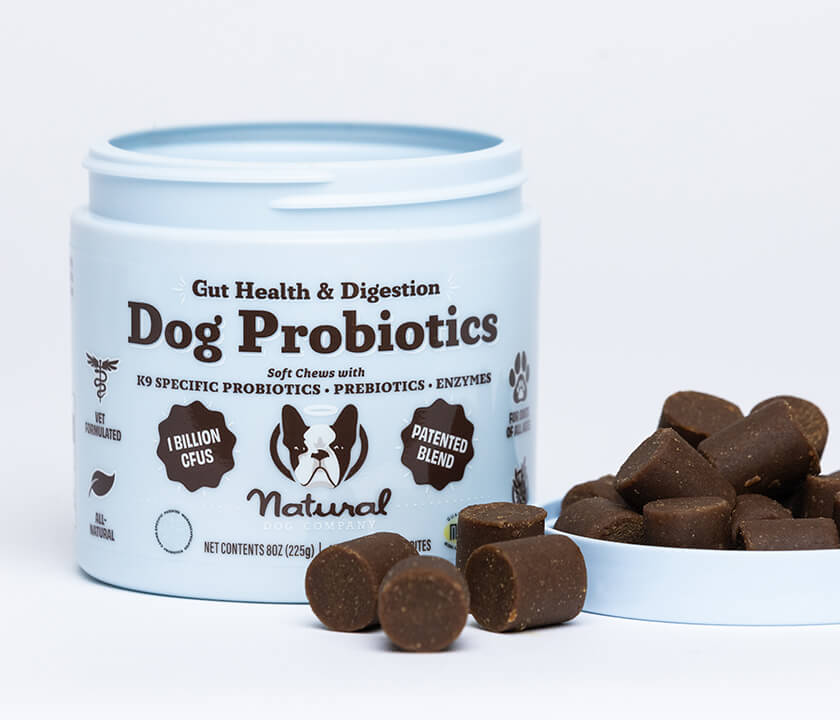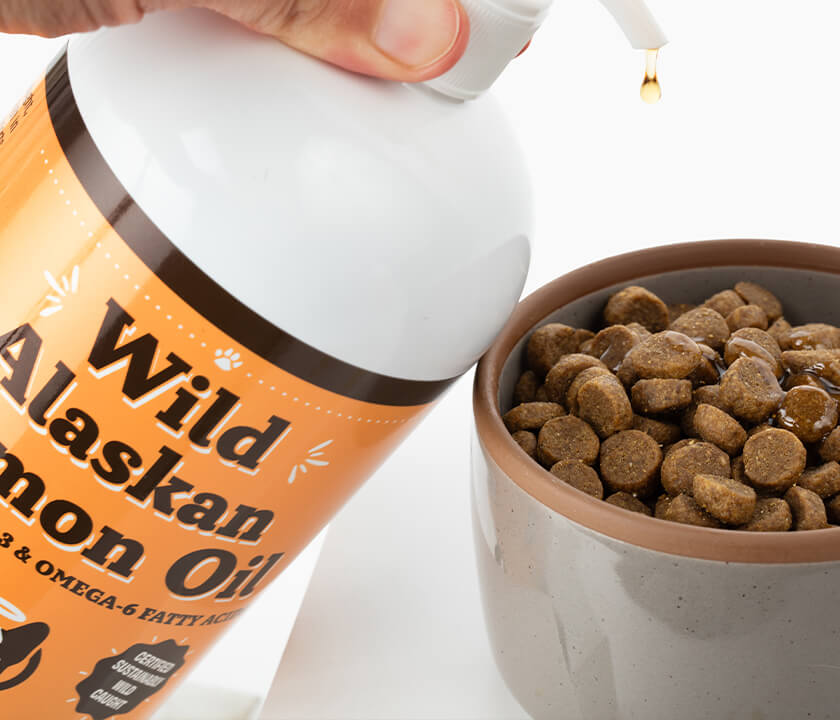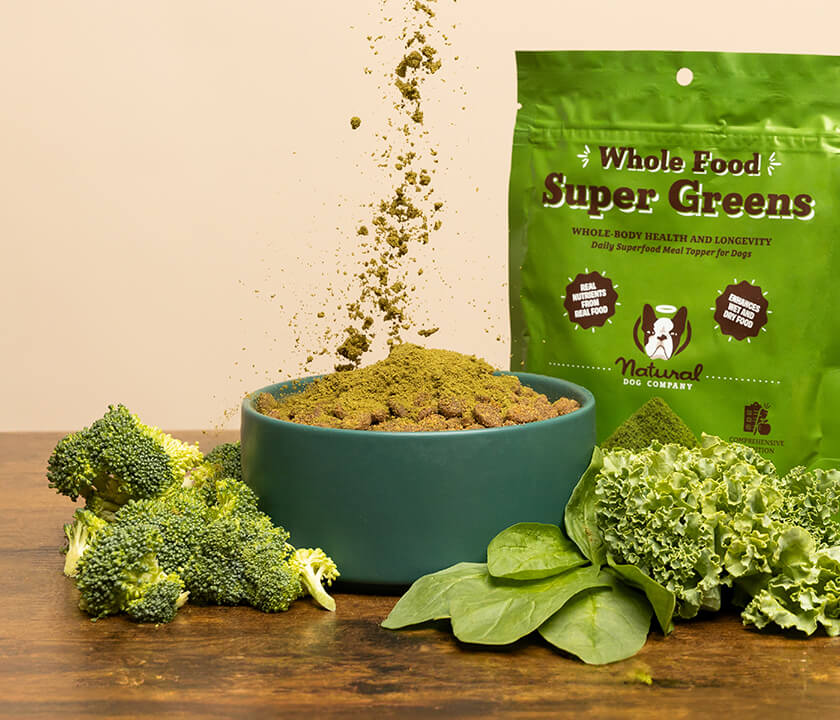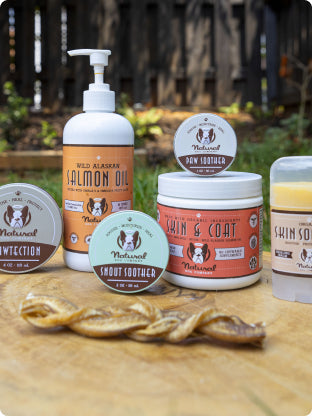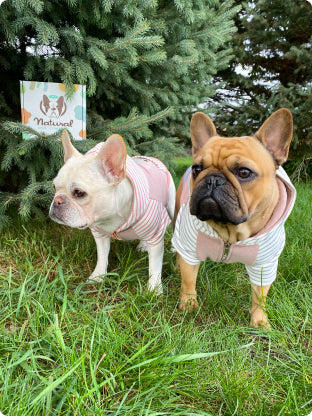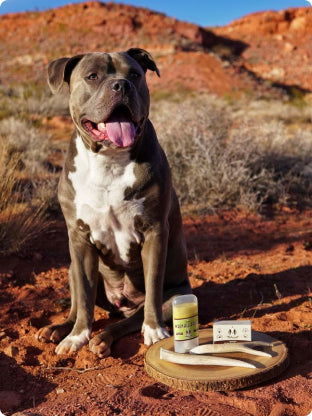We’ve known for decades that giving fish oil to dogs has some amazing health benefits, and hundreds of studies have since confirmed the validity of this superfood. But how do you choose the best fish oil for your dog in such a saturated market? There are lots of factors to consider, but we can help!
Benefits of Salmon Oil for Dogs

The benefits of salmon oil are abundant and delicious!
The first clinical studies of the health benefits of fish oil for dogs were published in 2010, and since then we’ve learned that salmon is likely the best source of Omega-3 and -6 fatty acids, as well as other vital nutrients.
Skin and Coat
The abundant omega-3 fatty acids found in pure salmon oil have some amazing properties, which may help to support healthy skin.
Salmon oil also contributes to overall skin and coat health for all dogs, so much so that we included it in our best-selling Skin and Coat Supplement chews!
Cognitive Function
Puppies and young dogs also benefit from extra DHA, which contributes to healthy brain and eye development. Since salmon contains particularly high levels of DHA compared to other fish species, it’s an essential food supplement for dogs of all ages!
Immune System
In addition to those DHA fatty acids, DHA has additional benefits to the immune system. The immune system is affected daily by internal and external factors, but the nutrients found naturally in Salmon Oil strengthen the response to these factors. A stronger immune system means a healthier overall body system for your dog!
Heart Health
You’ve probably heard that the American Heart Association recommends adding fish or fish oil supplements to your diet to promote heart health, but did you know that fish can also help your dog’s heart? Chesapeake Veterinary Cardiology Associates confirms that omega-3s "can improve heart muscle, and may reduce the potential for arrhythmias."
What to Avoid
Salmon oil sounds awesome, right? It is! However, not all fish oils are created equal. Here are some red flags you’ll want to look out for when shopping for fish oil for your pet:

Farmed fish are fed dry pellet food loaded with hormones and antibiotics, rather than healthy wild prey.
Farmed Fish
If you’ve shopped for fresh salmon for your own dinner table, you may have noticed that farm-raised salmon is much duller in color than bright-pink wild fish. This is because wild salmon eat smaller fish species and krill, which are loaded with astaxanthin—the beneficial antioxidant that also gives salmon its lovely pink hue.
What do farmed fish get for breakfast, lunch, and dinner? Usually, dried food pellets—made with fish trimmings, corn gluten, chicken fat, soybeans, and other byproducts of the animal feed industry. They’re also loaded up with hormones and antibiotics to keep them healthy and encourage fast growth.
For the highest amounts of good fatty acids, look for oil made from the healthiest fish: wild-caught salmon.
Unsustainable Fishing Practices
With our oceans in decline worldwide, it’s more important than ever to confirm that any fish products you buy have been sourced sustainably. A relative newcomer to the fish oil industry is krill oil, made from tiny, shrimp-like crustaceans fished out of Arctic waters. Although krill contain high levels of astaxanthin, they are an essential food source for the entire food chain in the Arctic and beyond, so overfishing is a serious concern.
In addition to overfishing, some fish oil manufacturers source their raw materials from polluted and highly trafficked waters off the coast of Africa. These fish can be loaded with heavy metals and other toxins which require extensive purification and chemical filtering techniques to remove before they can be ingested by pets.
Mixed Fish Species
Many products labeled simply “fish oil” are created using a hodge-podge of fish species rather than one high-quality species like salmon. These oils tend to have lower concentrations of EPA and DHA and higher levels of saturated fats, making them less healthy than pure salmon oil. Often, these cheaper “filler” fish are small filter feeders rather than predatory fish, meaning they’ll have lower amounts of astaxanthin, too.
Extensive Purification Processes
Pet fish oils created from mixed fish species and even fishmeal byproducts purchased from commercial processing plants require additional purifying to make them suitable for consumption. One of the most common purification processes uses ethanol to filter out toxins, but this breaks down the oil on a molecular level to the extent that it must be synthetically re-assembled.
Fish oils that have been processed this way are called ethyl esters and are not absorbed as well by the body (human or canine!) as less-processed triglyceride oils. EE fish oils also break down more quickly, leaving the potential for rancid oil on your pet’s meal.

So What is the Best Fish Oil for Dogs?
Now that you know what you don’t want from your fish oil, what factors make the best fish oil for your dog? You can find them all in Natural Dog Company’s Wild Alaskan Salmon Oil!
Single-ingredient:
Wild caught Alaskan Salmon oil is the only thing in this bottle!
Sustainably harvested:
Fished from pure and plentiful waters off the Alaskan coast.
Packed with nutrients:
Alaskan salmon species have the highest levels of omega-3s compared to fish from other locales.
Minimally processed:
Our oil is a triglyceride, giving it the greatest bioavailability with the least saturated fats.
Made in a reputable facility:
Our facility is FDA-certified for its Good Manufacturing Processes, certified non-GMO, and a recognized Friend of the Sea, among many other accolades.

“Obviously this is the ONE, mom!”
The best part about our salmon oil? Because it is minimally processed, it retains a strong fishy smell and flavor. Dogs go wild for this flavor and some of our customers even use it as a food topper to get their picky pups to finish their dinner!
For maintaining skin and coat health, supporting the immune system, promoting senior dog wellness, a healthier heart, and better eating habits, Natural Dog Company’s Wild Alaskan Salmon oil is the best fish oil for dogs. But don’t just take our word for it…
Real Reviews from Satisfied Customers:

My two-year-old Goldendoodle absolutely loves this Salmon Oil! She is typically a grazer, but when I add this to her food she eats the whole bowl of food right away. Will definitely purchase again! — Molly G., Greenville, SC

My dog is a picky eater and doesn’t always want to eat his food at mealtime. Adding a squirt of this Salmon Oil has helped him finish his bowl like a champ. This product is a win-win for us because he loves the taste and I love that he’s getting extra nutrients! —Emily E., Chapel Hill, NC
